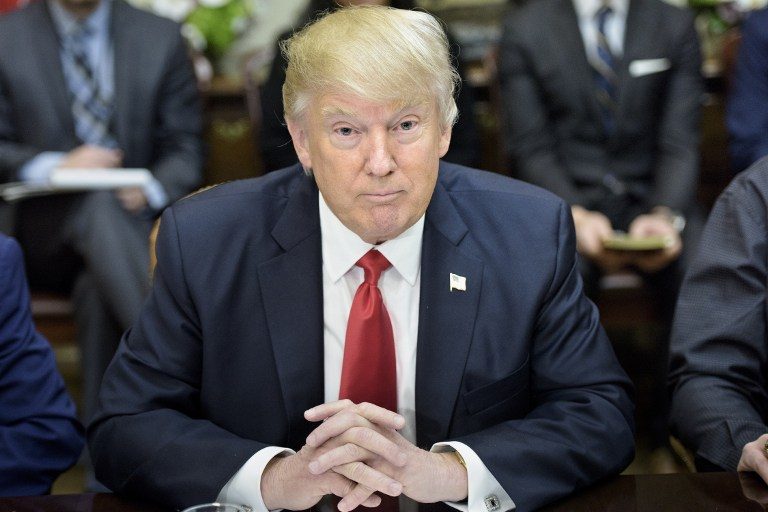SUMMARY
This is AI generated summarization, which may have errors. For context, always refer to the full article.

WASHINGTON, DC, USA (UPDATED) – US President Donald Trump slapped fresh sanctions on Iran’s weapons procurement network Friday, February 3, provoking an angry response from Tehran in what is an increasingly tense stand-off.
Officials said the new measures were in response to Iran’s recent ballistic missile test and its support for the Huthi rebels in Yemen, who recently targeted a Saudi warship.
The new sanctions do not yet mean that the US has abandoned commitments it made under the deal to lift measures aimed at Iran’s nuclear program, officials said.
But Trump has made no secret of his contempt for that accord, which his predecessor Barack Obama approved in July 2015, and officials said Friday’s measures would not be the last.
“Iran is playing with fire – they don’t appreciate how ‘kind’ President Obama was to them. Not me!” Trump tweeted.
During a visit to Tokyo on Saturday, February 4, US Defense Secretary James Mattis called Iran “the single biggest state sponsor of terrorism in the world.”
“It does no good to ignore it. It does no good to dismiss it,” he said, but added that there are no plans to increase US troops in the Middle East.
Hardline US National Security Adviser Michael Flynn also drew a stark line in the sand.
“The days of turning a blind eye to Iran’s hostile and belligerent actions toward the United States and the world community are over,” he said.
“This behavior seems continuous despite the very favorable deal given to Iran by the Obama Administration. These sanctions target these behaviors.”
Iran on Saturday was set to stage a show of defiance by deploying missiles for a Revolutionary Guards exercise.
The Guards’ Sepahnews website said the maneuvers were aimed at demonstrating their “complete preparedness to deal with the threats” and “humiliating sanctions” from Washington.
A list of missiles to be deployed, published on the site, showed they were of very short range – up to 47 miles (75 kilometers).
‘Strategic review’
US intelligence and Treasury officials are constantly scrutinizing Iran’s networks, looking for evidence of extremist funding and advanced weapons procurement.
The immediate trigger for the sanctions was Iran’s test, last Sunday, January 29, of a ballistic missile that US officials judge to have been capable of one day carrying a nuclear warhead.
But the latest detailed list of designations has clearly been in preparation for some time, and the White House says “nothing is off the table” – even military action.
“We are undertaking a larger strategic review,” a senior US administration official told reporters. “The launch of the missile was the triggering event.”
Washington is also concerned about attacks by Huthi rebels, a powerful faction in Yemen’s civil war which US intelligence believes is armed and supported by Iran.
This week Huthi forces attacked a Saudi warship operating off Yemen.
The senior official said Iran was “not necessarily responsible for every tactical decision” made by Huthi forces, but that it will be made to bear responsibility for its “proxies.”
Angry taunts
But Russia, which is allied with Iranian forces in its defense of Bashar al-Assad’s Syrian regime, is unlikely to allow new international sanctions to target Tehran.
US Treasury officials hope that preventing Iran’s networks in Lebanon and China from buying US goods or using the US financial system will curtail their activity.
Nevertheless, Trump’s pronouncements on the 2015 nuclear deal, and Iran’s angry response that his taunts are “baseless” and “provocative,” have raised fears of an imminent showdown.
The nuclear deal obliged Iran to curtail its nuclear program and halt any nuclear weapons research in exchange for relief from US and international sanctions targeting the sector.
It was agreed between Tehran and 6 powers – Britain, China, France, Germany, Russia and the US – and Obama’s White House hailed it as a blow against nuclear proliferation.
Trump, Israel and many US foreign policy hawks argue that the deal was too soft and that the windfall Iran won with sanctions relief will be funneled to terror networks.
If the deal collapses, however, some observers fear a nuclear arms race in the Middle East. US officials insist the new sanctions have no bearing on the deal – for now.
“Iran has to determine its response to our actions,” a senior administration official said.
“We are going to continue to respond to their behavior in an ongoing way and at an appropriate level to continue to pressure them to change their behavior.”
Hawks in Congress have been calling for broad measures to target entire sectors of Iran’s fragile economy.
Severe price
“Unless the Iranian regime pays a severe price for its malign activities, they are unlikely to stop,” said Mark Dubowitz, CEO of the Foundation for Defense of Democracies.
Think tank the Eurasia Group said the fate of the nuclear deal itself is in US hands and will be decided by “the harshness of the sanctions Trump puts in place.”
If he sticks to designating new individuals for existing sanctions, the deal will probably hold – “but it is a close call” – the group said in a briefing note.
If he aims for broader sanctions designed to hobble the Iranian economy, it may fall apart. – Rappler.com
Add a comment
How does this make you feel?
There are no comments yet. Add your comment to start the conversation.